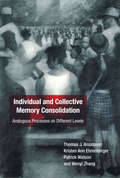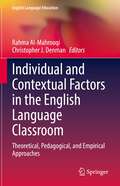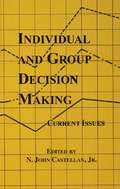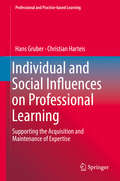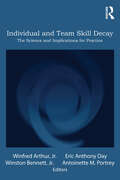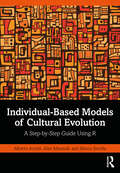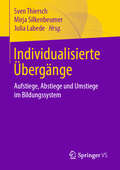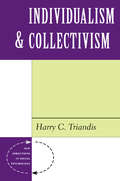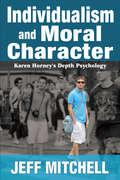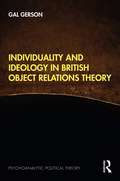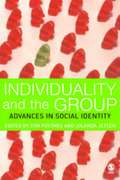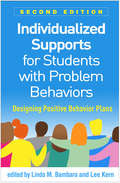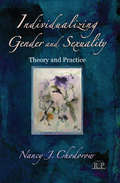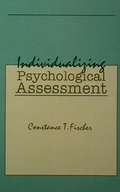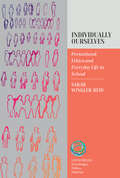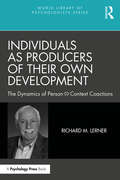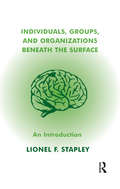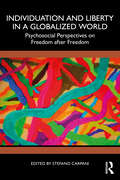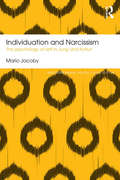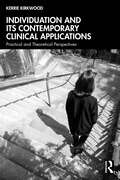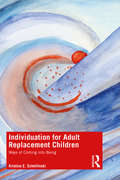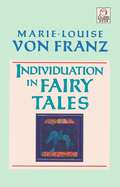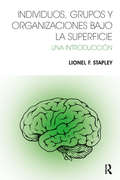- Table View
- List View
Individual and Collective Memory Consolidation: Analogous Processes on Different Levels (The\mit Press Ser.)
by Thomas J. Anastasio Kristen Ann Ehrenberger Patrick Watson Wenyi ZhangAn argument that individuals and collectives form memories by analogous processes and a case study of collective retrograde amnesia.We form individual memories by a process known as consolidation: the conversion of immediate and fleeting bits of information into a stable and accessible representation of facts and events. These memories provide a version of the past that helps us navigate the present and is critical to individual identity. In this book, Thomas Anastasio, Kristen Ann Ehrenberger, Patrick Watson, and Wenyi Zhang propose that social groups form collective memories by analogous processes. Using facts and insights from neuroscience, psychology, anthropology, and history, they describe a single process of consolidation with analogous—not merely comparable—manifestations on any level, whether brain, family, or society. They propose a three-in-one model of memory consolidation, composed of a buffer, a relator, and a generalizer, all within the consolidating entity, that can explain memory consolidation phenomena on individual and collective levels.When consolidation is disrupted by traumatic injury to a brain structure known as the hippocampus, memories in the process of being consolidated are lost. In individuals, this is known as retrograde amnesia. The authors hypothesize a "social hippocampus" and argue that disruption at the collective level can result in collective retrograde amnesia. They offer the Chinese Cultural Revolution (1966–1976) as an example of trauma to the social hippocampus and present evidence for the loss of recent collective memory in mainland Chinese populations that experienced the Cultural Revolution.
Individual and Contextual Factors in the English Language Classroom: Theoretical, Pedagogical, and Empirical Approaches (English Language Education #24)
by Rahma Al-Mahrooqi Christopher J. DenmanThis edited volume examines a number of topics related to the roles of individual and contextual factors in English as second or foreign language (ESL/EFL) settings by presenting chapters across the three sections of theoretical and pedagogical approaches, teacher and learner research, and research into the roles of technology. The book has a focus on practical actions and recommendations related to individual and contextual factors in ESL/EFL, with a specific concern with issues of cognition, metacognition, emotion, and identity, and offers perspectives from a diverse range of international education settings. For teachers of ESL/EFL, the effective recognition and integration of individual and contextual factors into the classroom may represent a significant challenge. This is often the case in those settings where native English speaking teachers work in foreign language contexts where they may have limited understanding of local cultures and languages, or where language instructors have class groups that are culturally and linguistically diverse. In these, and similar, contexts, the types and extent of individual and contextual factors impacting on language learning may challenge both learner and instructor expectations of what an effective and supportive classroom is. While such a situation offers numerous opportunities for learners and teachers to expand their knowledge of themselves and each other, it also presents the possibility for ineffective teaching and learning to occur. It is within this framework that the book presents the latest theoretical, pedagogical, and research perspectives from around the world, thereby providing a resource for all stakeholders with an interest in the roles individual and contextual factors play in the English learning process.
Individual and Group Decision Making: Current Issues
by N. John CastellanThe idea for this volume took root during a recent annual convention of the American Psychological Association. The contributors share a common vision of research in their particular area and have had an opportunity to debate and clarify their ideas. Taken as a whole, the fifteen chapters provide an exciting perspective of the field and form a basic set of readings for courses on individual and group decision making in a variety of disciplines. The coverage from basic laboratory research to complex applied group decision processes should challenge researchers and students to pursue the field of decision making as enthusiastic scientists and practitioners.
Individual and Social Influences on Professional Learning: Supporting the Acquisition and Maintenance of Expertise (Professional and Practice-based Learning #24)
by Christian Harteis Hans GruberThis book examines professional learning and relates it to the acquisition of expertise, and the influence of individuals. Professional learning, as discussed in the book, comprises all kinds of occupational domains because employment and paid work usually follow the achievement principle, i.e. workers are expected to perform efficiently. The book suggests that the perspective of expertise research is an appropriate lens to use for gaining insight in how individuals can be prepared and enabled to autonomously master the requirements of daily working life. Expertise is understood as the capacity to reliably perform on an extraordinary level, and the basic assumption is that experts are best prepared to successfully cope with future challenges at workplaces. The book comprehensively discusses issues of expertise research and explores the nature of a successful individual and an impeded individual. It proposes an integrated model of individual and social components of expertise development, the i-PPP model. The model provides insight in and an understanding of how individuals can be enabled to develop and maintain professional expertise in the context of daily work. Across all paradigms, researchers, policy-makers, employers and trade unionists agree that working conditions undergo permanent change through economic, societal, and technological developments. Recently, the digitalisation of (working) life became a hot topic of scientific and societal discourses. Workplaces, thus, provide challenges for individuals who have to be able to cope with workplace changes. Accordingly, new challenges emerge for an adequate understanding of learning for work as well as learning during work.
Individual and Team Skill Decay: The Science and Implications for Practice (Applied Psychology Series)
by Jr. Winston Bennett Winfred Arthur Eric Anthony Day Antoinette M. PortreySkill and knowledge retention is a major issue and concern in learning and skill acquisition, especially when trained or acquired skills (or knowledge) are needed after long periods of nonuse. The goal of this book is to summarize and advance the thinking of critical issues related to skill retention and decay in the context of individual and team training on complex tasks. This volume will be of interest to researchers and practitioners in the fields of industrial and organizational psychology, human factors, organizational behavior, and human resources management.
Individual-Based Models of Cultural Evolution: A Step-by-Step Guide Using R
by Alex Mesoudi Alberto Acerbi Marco SmollaIndividual-Based Models of Cultural Evolution shows readers how to create individual-based models of cultural evolution using the programming language R. The field of cultural evolution has emerged in the last few decades as a thriving, interdisciplinary effort to understand cultural change and cultural diversity within an evolutionary framework and using evolutionary tools, concepts, and methods. Given its roots in evolutionary biology, much of cultural evolution is grounded in, or inspired by, formal models. Yet many researchers interested in cultural evolution come from backgrounds that lack training in formal modelling, such as psychology, anthropology or archaeology. This book addresses that gap. It provides example code in R for readers to run their own models, moving from very simple models of the basic processes of cultural evolution, such as biased transmission and cultural mutation, to more advanced topics such as the evolution of social learning, demographic effects, and social network analysis. Features of this book: Recreates existing models in the literature to show how these were created and to enable readers to have a better understanding of their significance and how to apply them to their own research questions Provides full R code to realize models and analyse and plot outputs, with line-by-line analysis Requires no previous knowledge of the field of cultural evolution, and only very basic programming knowledge This is an essential resource for researchers and students interested in cultural evolution, including disciplines such as psychology, anthropology, archaeology, and biology as well as sociology and digital humanities.
Individualisierte Übergänge: Aufstiege, Abstiege und Umstiege im Bildungssystem
by Julia Labede Sven Thiersch Mirja SilkenbeumerDer vorliegende Band widmet sich der Frage, wie Auf-, Ab- und Umstiege im Bildungssystem organisiert sind, in verschiedenen Entwicklungsphasen und Sozialisationsräumen zustande kommen und von den Akteuren gedeutet werden. Diese Bildungsverläufe sind erst ansatzweise erforscht und diskutiert worden. In der Schul- und Bildungsforschung orientiert man sich nach wie vor stark an Normal(bildungs)laufbahnen und fokussiert die institutionell normierten Übergänge, um Bildungsbeteiligung, Bildungserfolg und soziale Bildungsungleichheiten zu untersuchen. Die Beiträge dieses Buches stellen demgegenüber unterschiedliche Theoriepositionen und aktuelle Ergebnisse zu den Dynamiken und Prozessen der Aneignung und Bewältigung individualisierter Übergänge dar. In diesem Zusammenhang werden Herausforderungen für die Bildungsforschung und Fragen zur pädagogischen Gestaltung dieser Übergangsformen formuliert.
Individualism and Collectivism: Theory, Method, And Applications (New Directions in Social Psychology #Vol. 18)
by Harry C Triandis<p>In this, his latest book, Harry Triandis explores the constructs of collectivism and individualism. Collectivists are closely linked individuals who view themselves primarily as parts of a whole, be it a family, a network of co-workers, a tribe, or a nation. Such people are mainly motivated by the norms and duties imposed by the collective entity. Individualists are motivated by their own preferences, needs, and rights, giving priority to personal rather than to group goals.Reviewing relevant literature in philosophy, political science, anthropology, sociology, and psychology, Triandis shows how culture shapes the way we think; and he also explores the wide-ranging implications of individualism and collectivism for political, social, religious, and economic life. He makes compelling arguments for the appreciation of both perspectives, drawing on examples from Japan, Sweden, China, Greece, Russia, the United States and other countries. <p>Triandis challenges the view that psychology is universal, offering evidence for culture-specific influences on thought and action. We learn that the cultural patterns represented by individualism and collectivism lead people to view their worlds through different lenses, attaching different meanings to life events. Triandis explains how these variations in meaning can help us better understand why crime rates, divorce rates, levels of self-esteem, feelings of well-being, and indeed overall behavioral patterns can be so different from one society to another.
Individualism and Moral Character: Karen Horney's Depth Psychology
by Jeff MitchellThere are hundreds of different systems of psychotherapy today, ranging from the traditional "talking cure" to symbolic "re-birthing" and primal scream. The landscape is littered with serious social science, pop psychology, esoteric doctrine, and pure charlatanism. One of the obvious dangers of so many choices is that the best therapies may be lost in a profusion of competing schools and traditions.To some extent, this has been the fate of the school of psychotherapy developed by Karen Horney. Since her death in 1952, Horney's work has received insufficient attention, in part because criticism of Freud's thought may have tainted attitudes toward psychotherapy in general. Jeff Mitchell argues that Karen Horney's school of psychoanalysis constitutes a highly innovative moral psychology. He interprets her approach to the treatment of personality or character disorders as a form of moral education.Drawing on research in the social sciences, particularly anthropology, sociology, and psychology, Mitchell argues that Horney's reworking of Freud's thinking preserves and builds upon what was truly insightful in his work, and eliminates the most dubious elements. Her thinking acknowledges that today individuals achieve their own identities rather than accepting what was ascribed to them by birth. This makes Karen Horney's theories especially relevant, both for psychotherapy as well as to thought about human affairs in general.
Individuality and Ideology in British Object Relations Theory (Psychoanalytic Political Theory)
by Gal GersonFollowing the work of prominent object relations theorists, such as Fairbairn, Suttie and Winnicott, Gal Gerson explores the correlation between analytical theory and intellectual environment in two ways. He notes the impact that the British object relations school had on both psychology and wider culture, and suggests that the school’s outlook involved more than a clinical choice. Gerson first interprets the object relations model as a political theory that completes a certain internal development within liberalism. He later outlines the relationship between the analytical theory and the historical setting in which it formed and took root. By engaging with these questions, Gerson demonstrates the deeper structure and implications of object relation theory for social philosophy. This allows him to answer questions such as: ‘What kind of social arrangements do we endorse when we accept object relations theory as a fair description of mind?’; ‘What beliefs about power, individuality, and household structure do we take in? What do we give up when doing so?’; and, lastly, ‘What does it say about contemporary advanced societies that they have taken in much of the theory’s content?’ Proposing a novel rethinking of human nature, Individuality and Ideology in British Object Relations Theory provides much-needed insight into how this school of psychoanalytic theory has impacted contemporary social and political life.
Individuality and the Group: Advances in Social Identity
by Tom Postmes Jolanda JettenSocial identity research has transformed psychology and the social sciences. Developed around intergroup relations, perspectives on social identity have now been applied fruitfully to a diverse array of topics and domains, including health, organizations and management, culture, politics and group dynamics. In many of these new areas, the focus has been on groups, but also very much on the autonomous individual. This has been an exciting development, and has prompted a rethinking of the relationship between personal identity and social identity - the issue of individuality in the group. This book brings together an international selection of prominent researchers at the forefront of this development. They reflect on this issue of individuality in the group, and on how thinking about social identity has changed. Together, these chapters chart a key development in the field: how social identity perspectives inform understanding of cohesion, unity and collective action, but also how they help us understand individuality, agency, autonomy, disagreement, and diversity within groups. This text is valuable to advanced undergraduate and postgraduate students studying social psychology where intergroup relations and group processes are a central component. Given its wider reach, however, it will also be of interest to those in cognate disciplines where social identity perspectives have application potential.
Individualized Supports for Students with Problem Behaviors, Second Edition: Designing Positive Behavior Plans (The\guilford School Practitioner Ser.)
by Linda M. Bambara Lee KernNoted for providing everything needed to develop individualized positive behavior support (PBS) plans for students with pervasive behavioral challenges, this authoritative guide has been revised and expanded to reflect 15 years of changes in the field. The book walks practitioners through the PBS process, emphasizing a team-based approach and presenting assessment procedures, intervention strategies, and guiding questions. Detailed case examples illustrate ways to meet the diverse needs of students across abilities, grade levels (PreK–12), and problem behaviors. In a convenient large-size format, the book follows the sequence of a typical PBS course, making it ideal for use in teaching and training. New to This Edition *Incorporates current tools and practices within an expanded, whole-school PBS approach. *Chapters on multi-tiered systems of support and the fundamentals of classroom management. *Chapter on writing, monitoring, and evaluating a complete PBS plan. *Two extended case examples that run through many of the chapters. *&“Commentaries from the Field&” in which leading experts reflect on the contributions, challenges, and future directions of PBS.
Individualizing Gender and Sexuality: Theory and Practice (Relational Perspectives Book Series)
by Nancy J. ChodorowNancy Chodorow, in her groundbreaking book The Reproduction of Mothering, quite simply changed the conversation in at least three areas of study: psychoanalysis, women's studies, and sociology. In her latest book, Individualizing Gender and Sexuality, she examines the complexity and uniqueness of each person's personal creation of sexuality and gender and the ways that these interrelate with other aspects of psychic and cultural life. She brings her well-known theoretical agility, wide-ranging interdisciplinarity, and clinical experience to every chapter, advocating for the clinician's openness, curiosity, and theoretical pluralism. The book begins with reflections on Freud's Three Essays on the Theory of Sexuality, followed by considerations of Melanie Klein and Stephen Mitchell, as well as on her own work and on the postmodern turn in psychoanalytic gender theory. Subsequent chapters address contemporary clinical-cultural issues such as women and work, women and motherhood, and men and violence. Concluding chapters elaborate on the multiple ingredients and the personal affective, conflictual, and defensive constellations and processes that create sexuality and gender in each individual. Ending with a chapter on homosexualities as compromise formations, Chodorow deepens her account of clinical individuality and sex-gender transference-countertransference while bringing her readers back to Freud and to the many strands that followed, as she consolidates a consistent line of interest in sexuality and gender, theory and practice, sustained over a lifetime.
Individualizing Psychological Assessment: A Collaborative and Therapeutic Approach
by Constance T. FischerAssessments by psychologists, educators, and other human-service professionals too often end with the client being reported in terms of scores, bell-shaped curves, traits, psychodynamic forces, or diagnostic labels. Individualizing Psychological Assessment uses these classification devices in ways that facilitate returning from them to the individual's life, both during the assessment session and in written reports. The book presents an approach and procedures through which a person's actual life becomes the subject matter of assessment. Thoroughly revised from the previous edition, the book presents a wide range of concrete examples and illustrative cases that will serve both students and practicing professionals alike in individualizing assessments.
Individually Ourselves: Personhood, Ethics, and Everyday Life in School (Lifeworlds: Knowledges, Politics, Histories #2)
by Sarah Winkler-ReidDrawing on ethnographic fieldwork in a London high school, Individually Ourselves demonstrates how young people elaborate notions of individual personhood through their friendships, and pervasive peer ethics, shaped in and through relations of power and inequality. By examining the interplay between ourselves and others during such a formative time of life, the book addresses how individuality is produced in everyday life and how our interactions help create the person we become.
Individuals and Identity in Economics
by John B. DavisThis book examines the different conceptions of the individual that have emerged in recent new approaches in economics, including behavioral economics, experimental economics, social preferences approaches, game theory, neuroeconomics, evolutionary and complexity economics, and the capability approach. These conceptions are classified according to whether they seek to revise the traditional atomist individual conception, put new emphasis on interaction and relations between individuals, account for individuals as evolving and self-organizing, and explain individuals in terms of capabilities. The method of analysis uses two identity criteria for distinguishing and re-identifying individuals to determine whether these different individual conceptions successfully identify individuals. Successful individual conceptions account for sub-personal and supra-personal bounds on single individual explanations. The former concerns the fragmentation of individuals into multiple selves; the latter concerns the dissolution of individuals into the social. The book develops an understanding of bounded individuality, seen as central to the defense of human rights.
Individuals as Producers of Their Own Development: The Dynamics of Person-Context Coactions (World Library of Psychologists)
by Richard M. LernerIn the World Library of Psychologists series, international experts present career-long collections of what they judge to be their most interesting publications—extracts from books, key articles, research findings, and practical and theoretical contributions. Professor Richard M. Lerner has been prominent in the application of developmental science across the life span for half a century, investigating dynamic, relational development systems, and their potential impact on positive youth development (PYD) and social justice. In this collection, Professor Lerner presents the development of his theory of, and research about, relations between life-span human development and contextual or ecological change, exploring the mutually influential relations between humans and their peer, family, school, and community contexts. Including a specially written introduction, in which Professor Lerner reflects on the importance of mentorship and contextualises both the field and the evolution of his wide-ranging career, this collection will be a valuable resource for students and researchers of developmental psychology.
Individuals, Groups and Organizations Beneath the Surface: An Introduction
by Lionel F. StapleyThis volume is an introductory text to the individual and organizational dynamics by an author with extensive experience in the field. It examines the unconscious processes of human behaviour that affect all organizations and institutions. It is aimed at those who are currently employed as managers or consultants, students of management, and others with the opportunity to develop knowledge skills and ability in an area of organizational behaviour, which has been largely inaccessible to the majority.
Individuation and Liberty in a Globalized World: Psychosocial Perspectives on Freedom after Freedom
by Stefano CarpaniWhat is the best way to understand the narratives of self-identity at the beginning of the 21st century? This interdisciplinary collection brings together perspectives from analytical psychology, sociology, psychiatry, psychosocial studies, and psychoanalysis to consider questions about individuation and freedom in our unhinged world. The contributors discuss the meaning of, and need for, individuation in individualized and liquid societies. The book begins with a comparison of three approaches: C.G. Jung’s individuation, Ulrich Beck’s individualization, and Zygmunt Bauman’s liquidity. This sets the tone for further consideration of topics including guilt, social media, global nomads, and surveillance. Theoretical reflections are enhanced by clinical material, and the book emphasizes the connections between sociology and psychoanalysis, offering significant insights into the importance of psychosocial approaches. This timely work will be of great interest to academics and scholars of psychosocial studies, Jungian studies, sociology, and politics.
Individuation and Narcissism: The psychology of self in Jung and Kohut (Routledge Mental Health Classic Editions)
by Mario JacobyDevelopments in Freudian psychoanalysis, particularly the work of Kohut and Winnicott, have led to a convergence with the Jungian position. In Individuation and Narcissism Mario Jacoby attempted to overcome the doctrinal differences between the different schools of depth psychology, while taking into account the characteristic approaches of each. Through a close examination of the actual experience of self, the process of individuation, narcissism and narcissistic personality disorder, Jacoby deftly demonstrated the benefits of a cross-fertilization of ideas and techniques for the professional analyst. This Classic Edition includes a new foreword by Kathrin Asper.
Individuation and Narcissism: The psychology of self in Jung and Kohut (Routledge Mental Health Classic Editions)
by Mario JacobyDevelopments in Freudian psychoanalysis, particularly the work of Kohut and Winnicott, have led to a convergence with the Jungian position. In Individuation and Narcissism Mario Jacoby attempted to overcome the doctrinal differences between the different schools of depth psychology, while taking into account the characteristic approaches of each. Through a close examination of the actual experience of self, the process of individuation, narcissism and narcissistic personality disorder, Jacoby deftly demonstrated the benefits of a cross-fertilization of ideas and techniques for the professional analyst. This Classic Edition includes a new foreword by Kathrin Asper.
Individuation and its Contemporary Clinical Applications: Practical and Theoretical Perspectives
by Kerrie KirkwoodThis insightful book identifies key points of reference for the delivery of ethical treatment to patients with extreme and entrenched pathologies. Readers are offered an invitation to the intensity and complexity of individuation.Written by a Jungian analyst with three decades of clinical experience, ranging from maximum‑security correctional institutions to private practice, the therapeutic encounter is relayed in detail, describing case examples of patients who would not traditionally be considered natural candidates for the process of individuation. Suggestions and considerations are provided to enable therapists to support their own patients to find a point of entry into their individuation process. It also encourages readers to reflect on themselves professionally and personally, with the ultimate purpose of being more clinically informed.Presented in an accessible way and featuring stories told that are touching and, in some instances, downright chilling, this is an essential resource for therapists and mental health practitioners, as well as anyone with an interest in this field of psychology.
Individuation for Adult Replacement Children: Ways of Coming into Being
by Kristina E. SchellinskiKristina E. Schellinski uncovers the hidden trauma of the replacement child – born into an atmosphere of grief to substitute for a lost sibling or other person – and helps adult replacement children discover the uniqueness of their self. Schellinski combines Jungian theory with research from over 20 years of clinical practice to demonstrate how adult replacement children who suffer from physical and psychological distress can rediscover the essence of their being in the transformative process of individuation. Theoretical yet practical, the book discusses core concepts of analytical psychology, psychoanalysis and attachment theory, and detailed case studies address grief, guilt, identity formation, relational challenges and shadow aspects. Schellinski explores how Jung’s birth after three dead children impacted his search for self and his theory and discloses her own personal experience. On treatment and prevention, she argues that by recognising elements of the condition, clinicians can facilitate acceptance, compassion and healing, and help reduce transgenerational transmission. This book is an indispensable tool for clinicians, analytical psychologists, psychodynamic psychotherapists and those in other medical professions, and will be of great interest to academics and readers interested in Jungian studies and existential questions. It offers adult replacement children and their families hope for a psychological rebirth.
Individuation in Fairy Tales: Revised Edition
by Marie-Louise von FranzWith a text revised and corrected by the author, this definitive edition of Individuation in Fairy Tales is rich with insights from religion, literature, and myth. Dr. von Franz focuses on the symbolism of the bird motif in six fairy tales of Europe and Asia: "The White Parrot" (Spain), "The Bath Bagerd" (Persia), "Princess Hassan Pasha" (Turkestan), "The Bid Flower Triller" (Iran), "The Nightingale Giser" (Balkans), and "The Bird Wehmus" (Austria). She explores the themes of psychological and spiritual transformation in the varied images of birds, such as the phoenix, the parrot, and the griffin. Special attention is given to the connection between fairy tales and alchemy and to the guidance that fairy tales give to therapeutic work.
Individuos, Grupos y Organizaciones Bajo La Superficie: Una Introduccion
by Lionel F Stapley Jose Maria Ruiz VacaThis volume is an introductory text to the individual and organizational dynamics by an author with extensive experience in the field. It examines the unconscious processes of human behavior that affect all organizations and institutions. It is aimed at those who are currently employed as managers or consultants, management students, and others wit
